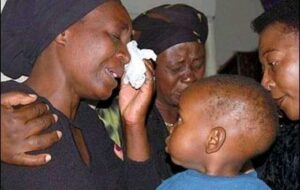At least 250 widows in the West region have reportedly staged a protest against what they described as ‘harmful’ traditional practices performed on them following the death of their husbands.
News Upfront gathered that the protesting widows recently converged on Bafoussam, chief town of the region to call for the end to the several cleansing rituals they are being forced to undergo at the demise of their spouses.
Demonstrations began when a mother of five children was chased from her marital home after her husband died recently, Amede Djoulde, member of the Association of Widows based in Foumban told the VOA news.
The women said they oppose practices that include the ritual of being forced to drink water used to bathe their late husband’s body as a proof of their innocence.
The women also believe the practice of having to stay with their in-laws for about a year after their husbands die is cruel.
One of the widows named Amina Nji, said she has been illegally chased out of her matrimonial home which she and her late husband constructed before his demise.
She was send parking by her deceased husband’s brother.
She is reported as having said her in-laws did not take into consideration where her and her five children will be sheltered.
Despite taking refuge in her oldest daughter’s matrimonial home she is determined to return to her home.
Some custodians of the tradition of the people in the West region are reportedly holding tight to these traditions which they say must be preserved for future generation.
Seidou Tonta, a notable in Koutoupit village said,
“we are surprised that the women want to abandon traditions intended to protect them.”

He explained that according to their tradition, widows are forced to undergo these rituals, for their own safety and may be cursed by their dead husbands should the engaged in certain acts or sexual relations.
Tonta stated that he is saddened that many people now believe in the doctrine of Christian churches that says God is against such practices.
It is a similar view held by another notable from the same village. Njingum Ngemnye, explained that their tradition gives authority to particular notables to cleanse a woman by shaving her head immediately after the burial of her husband.
“The female siblings of the late husband must accompany the widow to her farm, fetch water and watch over her by accompanying her everywhere she goes.” he added.
In some parts of the west region and beyond, women whose husbands die are equally obliged to wear only black attires for at least a year after their spouses pass on.
Refusal to undergo certain rituals after their partners’ death, are often accused of being responsible.
Women non-governmental organisations in Cameroon continue to clamour for the abolition of certain practices performed on widows which they considers as barbaric and inhumane. Ernestine Essah, an activist based in Foumban, Noun Division, told reporters in the West region, that they have organized several talks and conferences to propagate the rights of women and programmes that empower them to be economically independent.
According to the NGO, Association of Widows, the sufferings and burdens of these widows are enormous and in the worse scenario lead to their early graves.
Women are always accused of killing their husbands and no one seems to consider the pain they go through after losing their life partners, the NGO stated. During the 2012 International Widows Day celebration, the minister of Women’s Empowerment and the Family, Marie Therese Abena Ondoa has estimated the number of widows in Cameroon at over 500, 000 with the number expected to have increased over the years.








